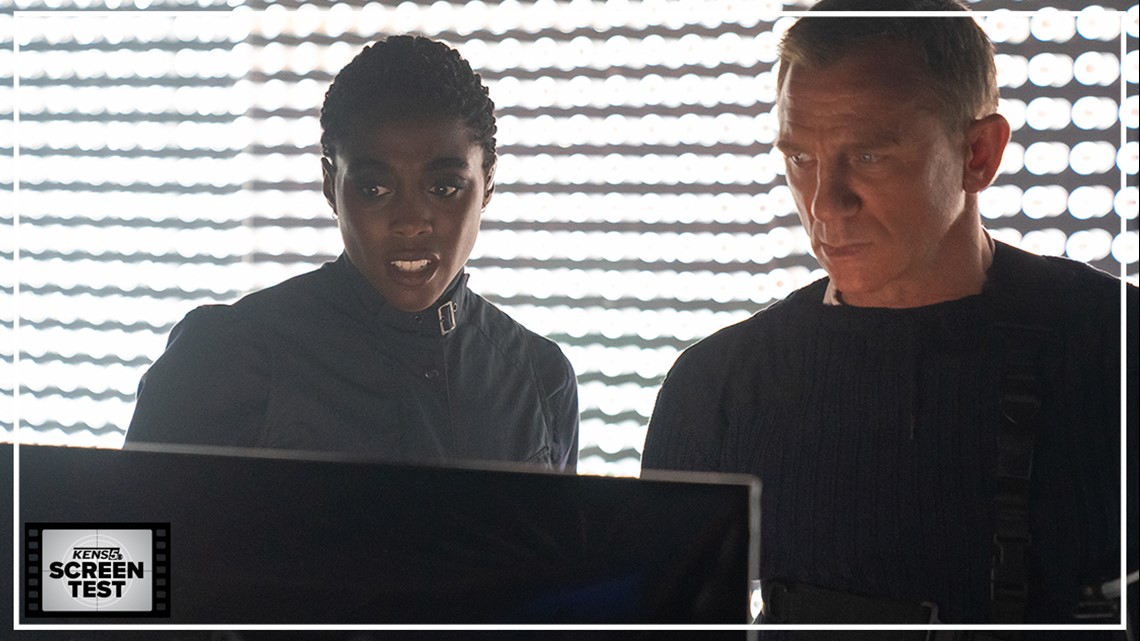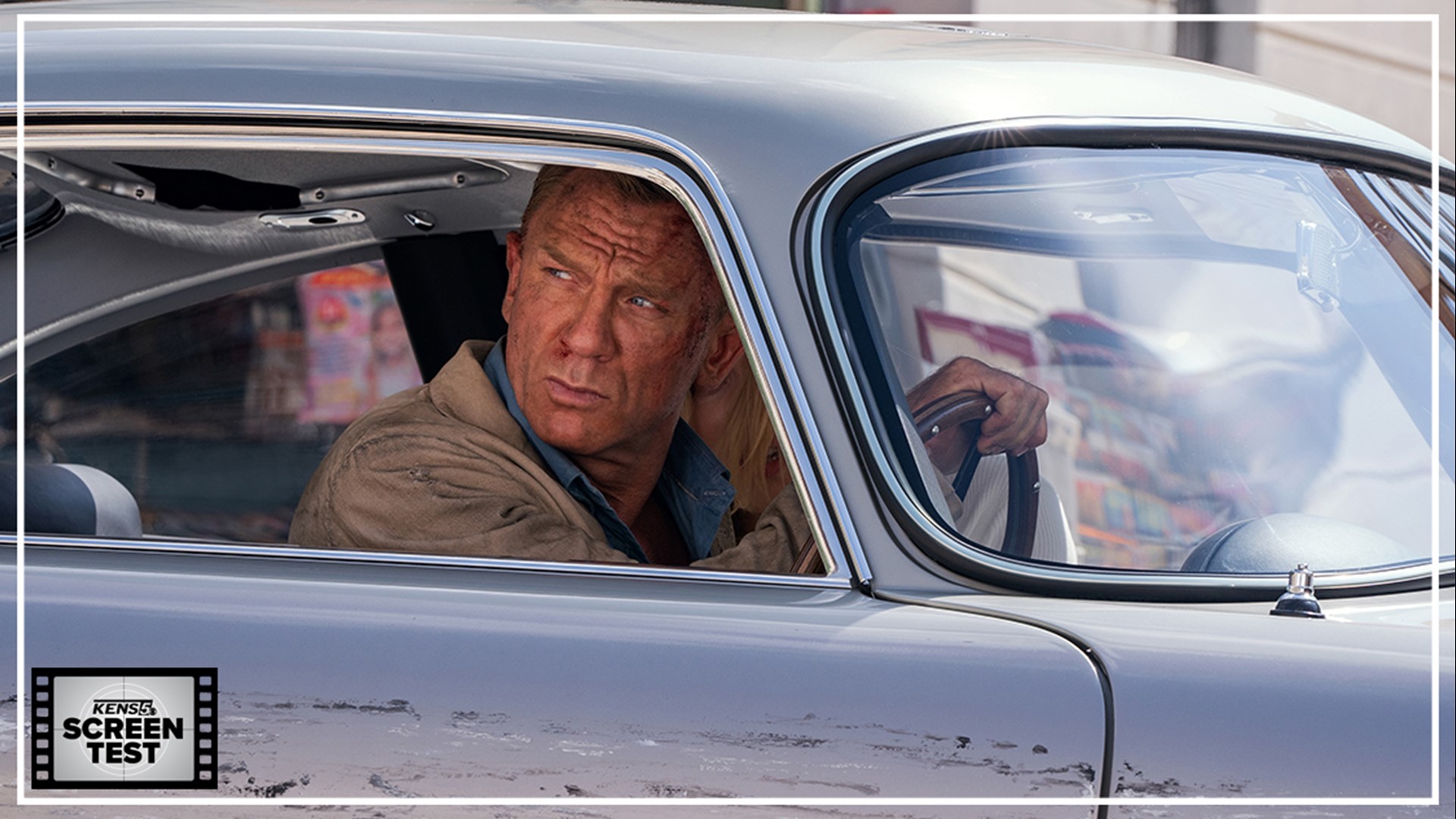Over 24 movies, James Bond has faced off against hitmen, lasers, collapsing buildings, murderous molars, golden guns, gravity, alligators, sharks, snakes, swords, nukes and the weaponization of the literal sun. Movie No. 25, the long-awaited “No Time To Die,” sees MI6’s most valuable asset clashing for the first time with culmination, that grand all-roads-have-led-to-this drop of the curtain we’ve come to expect thanks to Batman, Rey and Tony Stark. There’s no pinpointing when over the last 15 years – the longest span of time any actor has beared the license to kill – this run of 007 missions decided it was telling a not-entirely-cohesive interconnected story of cold-blooded angst amid the epic parkour chases and frantic shootouts, but “No Time To Die” does its bloated best to pay off the pivot from tradition.
Directed to frazzled, ambitious life by Cary Joji Fukunaga, the result is a grand affair befitting the shoddy arc this phase of the Bond franchise fashioned out of its glamour and gunfire. But in its forceful attempts to expand the scope of this run’s sincerity as well as its spectacle, Craig’s finale doesn’t feel like it’s coming full circle so much as arriving at inevitable destinations, beckoned there by a bleary-eyed script overanxious to satisfy the widest swath of moviegoers. “No Time To Die” arrives six years after “Spectre,” a movie of misbegotten construction but peppered with intriguing metatextual wrinkles which time has revealed, and while this may not be the worst of the Craig-era Bond flicks, it is the most redundant. When the smoke of its many explosions subsides, we find a film operating less by its own ethos than the familiar trajectory blockbuster movies have taken since this double-oh tallied his first official kills in 2006.
Speaking of explosions, the first doesn’t come until about 20 minutes into “No Time To Die,” a noticeable and purposeful delay propelling Bond out of yet another sunny retirement with Lea Seydoux’s Madeleine Swann, returning an unconvincing romantic dynamic from “Spectre.” He looks to be at peace, his cold heart defrosted by Italian sunshine and Madeleine’s insistence that he visit the local cemetery to heal the wounds he suffered the last time he was swallowed up by love in Venice. There’s a nagging, slightly frustrating suspicion that Bond should know better than to trust the solitude. Sure enough, the guardrails go back up as he’s yanked into another story of layered revenge and deceit.
Where “No Time To Die” deviates from formulas both recent and traditional is in its placement of Bond in his own story. The core delight of these movies lies in watching 007 keep up with foes who are constantly one step ahead of him, in entering the shadows not knowing what traps or betrayals lie in wait. In “No Time To Die,” the enemies are behind him, and gaining fast (despite a five-year time jump hastened along by Billie Eilish’s melancholic anthem). SPECTRE has ostensibly returned, and it’s by CIA agent Felix Leiter’s hand (Jeffrey Wright reprises the role) that Bond finds himself in the role of savior once again.
Resurrection isn’t a new idea for Craig’s Bond, nor is his pushback against irrelevance. But irrelevance, in addition to being a motivating force, can also be a great equalizer, and here it appears in the form of Nomi (Lashana Lynch), a smooth operator who has succeeded Bond as the new 007. Is that a glint of self-righteousness we spot in his eye? Suddenly he seems a bit nimbler while spearheading a CIA operation to extract an informant in Cuba before MI6 can, and this stellar early sequence – anchored by what amounts to a cameo by a sensational Ana de Armas as a green operative barely able to disguise her glee at being in the field – represents “No Time To Die” at its most balanced, harmonizing the thrills of well-paced action with the novelty and implications of Bond’s role-reversal.
The apocalyptic stakes are more foregrounded than ever before in the Craig canon, which is just to say Bond and Co. are fighting for the immediate fate of the world rather than merely disrupting business between terrorists or contending with personal vendettas. Nanobots and DNA-targeting are invoked as a bioterroristic scheme unfurls, but “No Time To Die” knows better than to impart any actual importance to them beyond shepherding the movie from beat to beat, from the stark glance of revelations discovered to massive final-act arenas Ken Burns would be proud of.
But over the course of that journey, intriguing ideas tend to be pigeonholed into disparate dynamics and comedic gags. Reunions with returning MI6ers Moneypenny (Naomie Harris) and Q (Ben Wishaw) don’t carry the same climatic air that they did in “Skyfall,” and the movie’s insistence to round out the story of a character introduced in “Spectre” results in a dramatic spark which fades before it has a chance to ignite a new blaze of pathos neither Connery, nor Moore, nor Brosnan ever saw their emotional journeys guided by. “No Time To Die” is a Bond movie that’s got air in its lungs, but struggles to stay in tune with itself. There’s too much slack in its dramatic stakes.
At their best, the Craig movies have encouraged deeper analysis of an action-movie archetype previously defined by the spy’s wit, womanizing and canny ability to weasel himself out of any brush with death (the new lens is not unlike the one Christopher Nolan applied to Batman a year before “Casino Royale” arrived). At multiple junctures in “No Time To Die” Bond is called out for being outdated, thematically synching the movie up with the ache of tragedy continuing to simmer under Craig’s eyes – as distinct a trademark as anything in the actor’s time on her majesty’s secret service – but the potency of that accusation wilts away elsewhere when he’s shown to have achieved a near-mythic status with his peers. The threat of anonymity doesn’t seem quite so clear when he’s shown to have literal fans in this entry.


This is a movie of moments, not momentum; of potent elements scattered in their application. Despite the bursts of satisfaction which flare up in the pseudo-rivalry between Bond and Nomi (a rivalry whose grip might be stronger in a movie with reshuffled priorities) or an atmospheric showdown which finds Bond playing bullfighter to roaring mechanical steers, the dominant sensation, regrettably, is limpness. How else to explain how the third act seems to defibrillate the proceedings back to life when our hero hurtles to the movie’s final arena?
It’s here where he’ll finally meet the person whom the movie’s marketing would have you think is our villain – Rami Malek’s Lyutsifer Safin, speaking in a low rumble and high capacity for boredom – but who really represents another living, breathing hall of mirrors. What is there left for Craig’s agent to contend with, having gone through more personal anguish than all the previous Bonds combined? A sort-of standoff which suppresses the quiet existentialism the actor suffused the character with, as it turns out, and a dispiriting affirmation that this script’s preferred method of cementing his legacy is by tripping over its own uncertainty that the best of these recent movies haven’t already cemented a legacy of their own.
Befitting his character’s resilience, Craig is too good not to grant his Bond a sheen of poignancy when it matters most. The landscape of the blockbuster action movie has changed a great deal since his introduction in the Bush era, and in the age of tights and capes and superpowers his ability to hang a clever line over the edge of bittersweetness still plays like gangbusters. “No Time To Die,” in a cheeky move, is bookended by two home invasions so antithetical in scope and consequence that they practically occupy different genres altogether. It’s one of Craig’s superhuman feats of acting in this series that he was able to so stylishly split the difference of the various contradictions these movies have thrown his way, right to the very end.
"No Time To Die" is rated PG-13 for sequences of violence and action, some disturbing images, brief strong language and some suggestive material. It releases in U.S. theaters Friday.
Starring: Daniel Craig, Ana de Armas, Lashana Lynch, Rami Malek, Lea Seydoux
Directed by Cary Joji Fukunaga
2021
MORE REVIEWS:
- ‘Venom: Let There Be Carnage’ Review: A breezy and most preposterous antihero sequel
- ‘Dear Evan Hansen’ Review: A Broadway hit makes its contrived and cloying leap to the big screen
- ‘I’m Your Man’ Review: Do androids dream of electric love?
- ‘The Card Counter’ Review: Oscar Isaac fills the shoes of Paul Schrader's latest soul-searching wanderer
- ‘Shang-Chi and the Legend of the Ten Rings' Review: A top-tier MCU performance to put you in the mood for more Marvel

